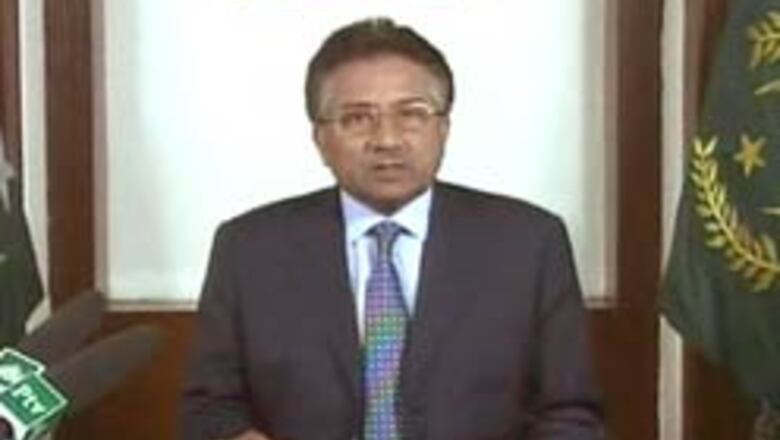
views
Islamabad: Politically isolated, unloved by his people and no longer in command of the Army, Pakistan's President Pervez Musharraf faces a battle for survival once his foes unite on the floor of the National Assembly next week.
An incoming coalition government aims to reinstate the Supreme Court judges Musharraf dismissed last November before they could sack him, in the first salvo of a face-off with a president who came to power as a general in a coup in 1999.
"I think the die has been cast," said independent analyst Nasim Zehra. "Pakistan continues to move ahead on an irreversible path towards constitutional democracy."
Musharraf has called on the new National Assembly to convene next Monday following weeks of coalition building by the victors of a February 18 poll.
Asif Ali Zardari, the late Benazir Bhutto's husband, and Nawaz Sharif, the prime minister Musharraf had deposed, agreed on Sunday to form a coalition and bring back the judges.
It is the first time Pakistan's two main parties have united. Together with smaller allies, they can almost muster the two-thirds majority needed to impeach Musharraf if they want.
Zehra anticipates resistance to moves to restore the judiciary, but Musharraf lacks both political and constitutional ammunition to mount a viable defence.
He has presidential powers to dismiss the government, but analysts say using them would lead to street agitation. With a showdown looming, Pakistanis are asking how much longer Musharraf can last.
The assessment in Islamabad's diplomatic circles is that it will be game over soon for a US ally who became a spent force after giving up his role as army chief last November.
Western allies and regional neighbours have been worried about the potential for instability in a nuclear-armed state, under attack from within by militants inspired by al Qaeda.
DESTABILISING FACTOR
Musharraf has been unable to convince people to support a US-led war on terrorism, and they are unhappy with the hardships that have accompanied economic growth he's overseen.
Moreover, analysts say, he created a political mess by distorting the constitution and destroying the judiciary in order to keep the presidency.
He invoked Emergency rule on November 3 for six weeks to purge a Supreme Court that might have annulled his re-election while army chief by a subservient parliament in the last days of its term.
Shafqat Mahmood, a former Cabinet minister-turned-analyst, said Musharraf should bow to the incoming coalition's mandate rather than destabilise it by fighting against its wishes.
"I think we had almost a historic accord in which the major political forces have come together and there is a promise of a stable government," said Mahmood. "I think that's why Musharraf has to give up now."
Most analysts hope Musharraf recognises his isolation, and opts to negotiate safe passage into retirement. Ijaz Shafi Gilani, the chairman of pollster Gallup Pakistan, reckons Musharraf's resignation could be imminent. "I still feel it's a matter of days or weeks," he said.
Army Chief General Ashfaq Kayani last week spelt out that he wanted to keep the military out of politics, increasing doubts whether the Army would go out on a limb to back Musharraf against an elected government.
The US administration, which has been one of Musharraf's main supporters, also struck a neutral tone last week. Deputy Secretary of State John Negroponte omitted the usual praise for Musharraf in testimony to a Senate committee, substituting it with the impersonal assertion that Pakistan was 'indispensable'.
"The weaker he gets the less use he can be," said one Western observer in Islamabad, who declined to be identified.
POTENTIAL COMPROMISE
Yet investors in a Pakistani stock market that, despite everything, has bucked regional trends to post gains this year remain optimistic, mostly out of belief the army and the United States will make sure any confrontation between the president and parliament is short-lived.
The new government needs to address a deteriorating security situation, rising inflation, widening fiscal and current account deficits, and breathe life into a peace process with India.
Najam Sethi a top political analyst and editor of the Daily Times, expects battles ahead, and foresees Musharraf's foes testing his resolve to stay on.
But he cautioned against prematurely predicting the end of the Musharraf era, as parliament could work out a compromise as Zardari is less keen on a fight with Musharraf than Sharif.
Even if Musharraf avoids an early exit, his powers are likely to be clipped and his role reduced to that of a figurehead. Musharraf's loyalists hope the election victors will quickly fall out. It could well happen, given their old enmity, but most analysts believe Musharraf will go first.




















Comments
0 comment